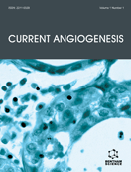Abstract
Increasing experimental and clinical research suggests a role for platelets in angiogenesis. These cells are major storage and delivery vehicles of a broad array of growth factors, chemokines, cytokines, proteases and cell adhesion molecules, which are secreted upon activation and determine the local angiogenic stimulus. Although platelets contain both, pro- and antiangiogenic molecules, there is a general consensus that platelets promote angiogenesis by stimulating chemotaxis, proliferation, and differentiation of endothelial cells and recruitment of progenitor cells to sites of vascular injury. However, a growing body of evidence indicates that the angiogenic proteome of platelets can be modified under stressful microenvironmental conditions such as cancer. How platelets regulate angiogenesis in different clinical scenarios is not completely understood. The amplification of angiogenesis by platelets plays a positive and beneficial role in several processes, such as pregnancy and tissue healing, where new vessel development is required. However, in clinical conditions associated with abnormal or excessive angiogenesis including cancer, atherosclerosis, and arthritis, platelets might contribute to the detrimental progression of these diseases. This review represents an integrated summary of the current knowledge regarding the role of platelets in angiogenesis and its consequences in health and disease.
Keywords: Alpha-granules, angiogenesis, cancer, endothelial cells, growth factors, platelets.
 25
25

